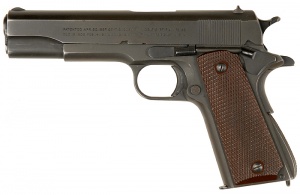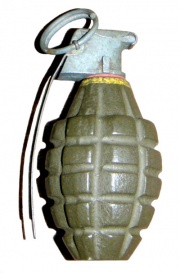| A Bridge Too Far
|
|
Cinema Poster
|
| Country
|
 United States United States
 United Kingdom United Kingdom
|
| Directed by
|
Richard Attenborough
|
| Release Date
|
1977
|
| Language
|
English
German
Dutch
|
| Studio
|
Joseph E. Levine Productions
|
| Distributor
|
United Artists
|
|
|
A Bridge Too Far is a 1977 World War II film based on the 1974 bestselling book of the same name written by Cornelius Ryan and was directed by Sir Richard Attenborough, the British actor/director who was known for his work both in front of the camera (The Great Escape) as well as behind the camera (Gandhi) and perhaps is better known to younger viewers for his portrayal of "John Hammond" in the films Jurassic Park and The Lost World: Jurassic Park. The screenplay adaptation was written by William Goldman (Marathon Man, Harper, Misery) and the film featured an all-star cast including Sean Connery, Gene Hackman, Laurence Olivier, Ryan O'Neal, Robert Redford, James Caan and Anthony Hopkins. A Bridge Too Far follows the events surrounding Operation Market Garden, an audacious military plan to end the war in Europe by landing Allied paratroopers along a series of bridges in enemy-occupied Holland in order to allow a British armored column to pass into Germany.
See the Discussion section for some trivia on the film.
The following weapons were used in the film A Bridge Too Far:
Allied Weapons
Rifles/Carbines
Lee-Enfield No.4 Mk 1*
The Lee-Enfield No.4 Mk 1* is carried by the majority of the British troops, mostly the Grenadier Guards in the armored column as well as the British 1st Airborne Division when they were trapped in Arnhem. The No.4 Mk 1* rifle was also seen in the hands of the Polish Airborne Brigade troops. Colonel John Frost (Anthony Hopkins) was also seen using a No.4 Mk 1* rifle during the later stages of the battle for Arnhem.

Lee-Enfield No.4 Mk 1* - .303 British

British troops from the XXX Armored Corps advance with a variety of weapons including the No.4 Mk 1* rifles.

As Colonel John Frost (
Anthony Hopkins) prepares to enter the street in Arnhem, his soldiers are seen armed with No.4 Mk 1* rifles.

A British 1st Airborne soldier fires his Lee-Enfield No.4 Mk 1* rifle before he gets shot by German soldiers.
M1 Garand
The main rifle used by US Airborne troops in the film is the M1 Garand. A gas-operated clip-fed semi-automatic shoulder weapon, it served as the primary American weapon from 1942-1957 and notably used by Major Julian Cook (Robert Redford) of the 82nd Airborne while leading his men to capture the Nijmegen Bridge. German troops crossing a small bridge also appear to be carrying M1 Garands. Though it's quite possible German soldiers could have used captured American Garands, their use in this particular sequence appears to be continuity error.

Brigadier General James Gavin (
Ryan O'Neal) takes the cover off of his M1 Garand after landing in Holland.

Major Julian Cook along with other troops of the 82nd Airborne use their M1 Garand rifles to row across the Rhine River while attempting to take Nijmegen Bridge.

Major Julian Cook of the 82nd Airborne leads his men carrying an M1 Garand.

Major Cook hunkers down with his M1 Garand.
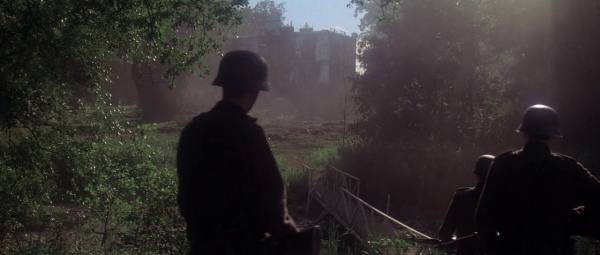
German soldiers appear to carry their captured M1 Garand rifles.
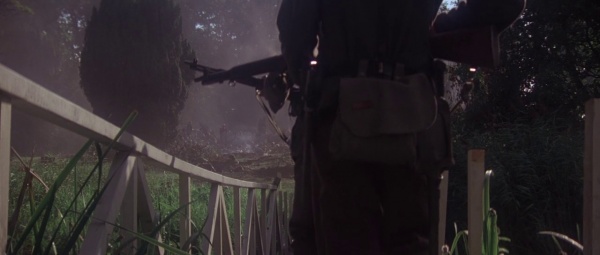
German soldiers move across a small bridge while carrying M1 Garands.
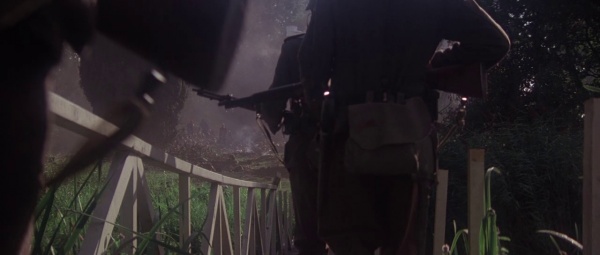
German soldiers with their captured M1 Garands.
M1 Carbine
The M1 Carbine is also used by US Airborne officers and NCOs in the film. Most notably seen when Sergeant Eddie Dohun (James Caan) pulls one out of his jeep when he is hiding from a German patrol in the forest. Also used by Col. Robert Stout (Elliott Gould) when leading the charge to capture the Son Bridge.

World War II Era M1 Carbine with dark walnut stock, 'L' peep sight and no bayonet lug - correct for most of WW2, shown with khaki sling and magazine pouch for buttstock - .30 Carbine

Col. Robert Stout (
Elliott Gould) leads 101st Airborne paratroopers in his charge to capture the Son Bridge. Stout carries a correct World War II era M1 Carbine. The character of Col. Stout was based on Colonel Robert Sink (portrayed by
Dale Dye in the miniseries
Band of Brothers), commander of the 506th Parachute Infantry Regiment, which was about to seize the Son Bridge when the Germans managed to blow it up just before they got there.

M1 Carbine, late 1945 issue - .30 Carbine. Usually referred to as the Korean War Era M1 Carbine, since it saw the most US military action in that campaign. Also there are no wartime photographs of soldiers carrying this model Carbine during World War II, however occupation troops have them. It has the adjustable rear sight and a bayonet lug.

An exhausted 101st Airborne MP points the way with his M1 Carbine. Note that though the "L" peep sight is correct, the bayonet lug is Korean War issue.

Sgt. Eddie Dohun (
James Caan) readies his M1 Carbine. This Carbine is a post World War II variant with a bayonet lug and an adjustable rear sight.

Closer shot of Sgt. Eddie Dohun with his anachronistic Korean War vintage M1 Carbine.
M1A1 'Paratrooper' Carbine
A folding stock version of the M1 Carbine, the M1A1 Carbine should have been more prevalent among the US Airborne troops, however only a few samples are ever seen in the film, most notably during large scenes of massing troops.

M1A1 Carbine with original 'L' style rear sight, and side-folding stock, often referred to as the 'Paratrooper' Carbine - .30 Carbine

The US Airborne troops on the far left are seen carrying the M1A1 Carbines.
Handguns
Colt M1911A1
The Colt M1911A1 is used throughout the film, especially by Sgt. Eddie Dohun (James Caan) when threatening an Army combat surgeon (Arthur Hill) in order to convince him to treat his wounded captain (Nicholas Campbell). The handgun is also seen, albeit briefly, holstered amongst American officers, NCOs, and Military Police.

Sgt. Eddie Dohun (
James Caan) threatens the combat surgeon (Arthur Hill) to convince him to treat his friend and commanding officer. Interestingly and anachronistically, he uses a modern Weaver stance instead of a more accurate one-handed shooting stance.
Colt M1911
Apparently, the widespread issue of Browning Hi-Power pistols (the iconic handgun of elite British Military units in World War II) to British Airborne units only started after Operation Market Garden, so it is appropriate that they are seen using another handgun. A likely candidate in this case is the Colt M1911 chambered in .455 Webley, issued to members of the R.A.F. In the film, the M1911 is used by British 1st Airborne Major General Roy Urquhart (Sean Connery) and several other Airborne officers as they try to evade capture by Waffen SS forces.
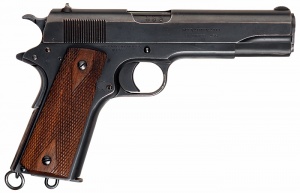
Colt M1911 - .455 Webley, a licensed handgun to the British Armed Forces after World War 1, issued to members of the R.A.F. (and possibly by association, members of the Army Airborne)

British 1st Airborne Major General Roy Urquhart (
Sean Connery) fires his M1911 variant, quite possibly the .455 Webley version of the Colt M1911.

Urquhart (
Sean Connery) fires his M1911 variant at a German soldier outside the window.
Submachine Guns
Sten Mk. V
The Sten Mk V is the standard submachine gun for British and Polish Airborne units in the film, most featured had the forward pistol grip removed as was the case for Operation Market Garden.

A British paratrooper on the left carries the Sten Mk V that still is fitted with a forward pistol grip.

A shot of Colonel Frost and some of his paratroopers, one of which carries a Sten.

Brigadier Lathbury carries a Sten Mk V with what looks to be a skeleton stock, rather than the standard fixed stock. It can still be recognized as a Mk V and not the earlier Mk II due the forward iron sights (same as those on the Lee-Enfield No.4 Mk 1* rifle).

The Sten is held by a British Corporal.

A British paratrooper responds to Col. Frost, carrying a Sten Mk V.
M1A1 Thompson
The M1A1 Thompson is briefly seen in the hands of US Airborne troops during the drop into Holland. Strangely, the Thompson is not prominently featured in the film despite being one of the primary weapons carried by the US Airborne along with M1 Garands and M1A1 folding stock Carbines.

An 101st Airborne paratrooper (seen to the left of the jeep) runs off with his M1A1 Thompson.

The paratrooper on the right holds his M1A1 Thompson.
M1928A1 Thompson
At least one M1928A1 Thompson is seen being carried by one of the US Airborne paratroopers.

M1928A1 Thompson with 30 round magazine - .45 ACP. This variant has the 'simplified' rear sight that would be adopted for the M1 Thompson.

An 101st Airborne paratrooper on the right runs across with his M1928A1 Thompson, noted by the top actuator (wartime-produced M1/M1A1 Thompsons have side actuators). This seems to be the only case where an M1928A1 Thompson appears in the film, however.
Machine Guns
M1918 Browning Automatic Rifle
The Browning Automatic Rifle is carried by US Airborne troops in the film, notably by 82nd Airborne troops during the assault on the Nijmegen Bridge.

Early version M1918 Browning Automatic Rifle - .30-06

An 82nd Airborne paratrooper with his modified BAR ready to provide cover fire for Major Cook (
Robert Redford) during the assault on the Nijmegen Bridge. This appears to be an older model M1918 BAR, rather than the M1918A1 or M1918A2, noted by the particular early handguard and lack of bipod.
Bren Mk. I
Bren Mk I light machine guns are also used by the British Grenadier Guards of XXX Corps.
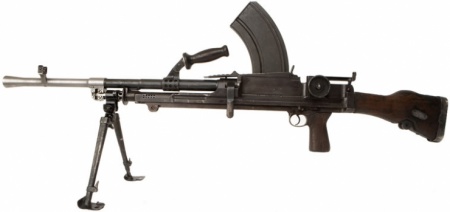
Bren Mark I - .303 British

A Grenadier Guards soldier fights with his Bren.

A British 1st Airborne soldier readies to fire his Bren.
Browning M2HB
The Browning M2HB is used by British Armored troops, mounted on their Lend-Lease Sherman tanks and half-tracks.
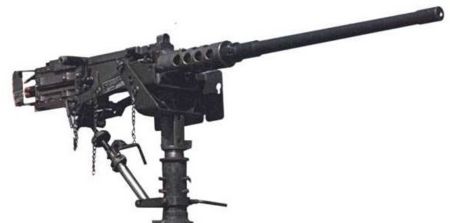
Browning M2HB on vehicle mount - .50 BMG

A Grenadier Guards soldier fires the Browning M2HB. (Note: In the film, the sound effect for the .50 cal gun is that of an MG42!)
Vickers Mk. I
The Vickers machine gun is used by the Grenadier Guards of XXX Corps.

Vickers Mark I - .303 British

A Grenadier Guards soldier firing the Vickers.
Others
PIAT
The PIAT (Projector Infantry Anti-Tank) spigot mortar is seen throughout the film being used by British and Polish Airborne units (who were similarly equipped). This weapon fired a 3-pound hollow charge warhead via means of a powerful spring which ignited its propellant. The weapon had a powerful recoil, which necessitated it being fired prone since any other position would knock the user flat down. Seen especially during the repulse of the initial German assault on Arnhem Bridge.

Projector, Infantry, Anti-Tank (PIAT) - 3.25 inch

A British 1st Airborne soldier prepares to defend Arnhem with the PIAT.

A British 1st Airborne soldier uses a PIAT.

View of the left side of the PIAT.
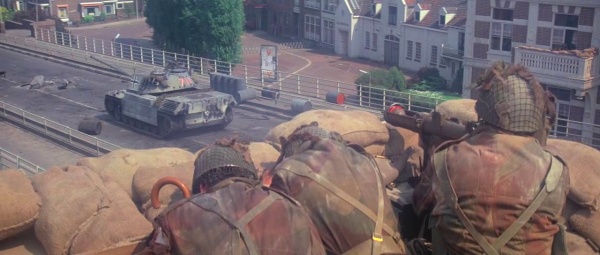
A paratrooper tries to use the PIAT to hit the rear of a German tank.
Ordnance QF 6-pounder
The landing zone of Major General Roy Urquhart (Sean Connery) is covered by several Ordnance QF 6-pounders.
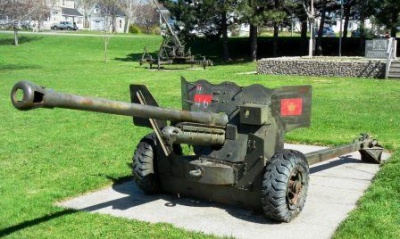
Ordnance QF 6-pounder - 57x441mmR

Two QF 6-pounders are seen in the background behind Major General Urquhart and Cpl. Hancock (Colin Farrell).
Ordnance QF 25-pounder
British soldiers use Ordnance QF 25-pounder Howitzers.

Royal Ordnance QF 25-pounder gun - 87.6mm

British soldiers fire their howitzers to start the Operation with a rolling barrage.
No. 2 Portable Flamethrower
A No. 2 Portable Flamethrower is used in the attack on the German bunker on Arnhem Bridge. This weapon, known as the "Lifebuoy" for its resemblance to a lifesaver, was the standard British flamethrower.

No. 2 Portable Flamethrower

Cpl. Davies (
Alun Armstrong) with the No. 2 Portable Flamethrower. Note the "Lifesaver" shape of the fuel reservoir.
Mk II Hand Grenade
The Mk II Hand Grenade is carried by several US paratroopers in the film.

Brig. Gen. James Gavin (
Ryan O'Neal) carries the Mk II hand grenade on his webbing along with his M1 Garand.
Axis Weapons
Rifles
Karabiner 98k
The Karabiner 98k was the standard weapon for all German ground forces during World War II. Several of the rifles used in the film appear to be shortened Gewehr 98 rifles, based on the prominent Lange-Visier rear sight. This is a very uncommon conversion; most Gew.98-to-Kar98k conversions used the tangent-leaf sight of the Weimar-refurbished Gewehr 98.

Karabiner 98k - 7.92x57mm Mauser

Mauser Gewehr 1898 - 7.92x57mm Mauser, for comparison.

German SS soldiers defend the Nijmegen Bridge with their K98s. Note the two nearest rifles have the distinctive
Lange-Visier rear sight of the Gewehr 98.

A boy drafted into the SS fights the Americans with his Mauser rifle. The distinctive
Lange-Visier rear sight of the Gewehr 98 can be seen.

German SS soldiers fight for the Nijmegen Bridge with their K98k rifles.

A German soldier aims his Karabiner 98k.
Gewehr 1898
A Mauser Gewehr 1898 is used by a German soldier who is defending the Nijmegen Bridge.

Mauser Gewehr 1898 - 7.92x57mm Mauser

A German soldier fires his rifle at US troops. Note the straight bolt handle.
Karabiner 98k Sniper Rifle
The Kar98k's sniper variant is used by Wehrmacht (German Army) designated marksmen and snipers.

Karabiner 98k with Zeiss ZF42 scope - 7.92x57mm Mauser

A German soldier aims his K98 sniper rifle before get shot by Major Cook.
Karabiner 98AZ
During the German retreat at the beginning of the film, one of the soldiers is seen with a Mauser 98AZ Artillery Carbine.

Mauser Karabiner 98AZ - 7.92x57mm Mauser

A slung 98AZ. Note the hooded sight and the "hook". The latter was used as an aid when stacking rifles together.
Submachine Guns
MP 40
The MP 40 is used by German troops in the film. A British paratrooper also uses a captured MP 40 during the chaotic urban combat in Arnhem.
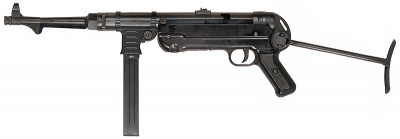
Maschinenpistole 40 - 9x19mm

A German soldier (Tim Beekman) with his MP 40. He fires it briefly but the sound is actually that of an MG 42.

The MP 40s are seen in hands of retreating German soldiers.

A British 1st Airborne soldier uses his captured MP 40 during the battle for Arnhem. An interesting trivia: The British Sten submachine gun was designed to take the stick magazine of the MP 40 meaning the British forces could (and probably did) use German ammo and magazines. In this case, though, the paratrooper had no time to properly "loot" the Germans.

Lieutenant General Wilhelm Bittrich's (
Maximilian Schell) guards carry MP 40 submachine guns.
Machine Guns
MG 34
The most commonly seen machine gun used by German troops in the film is the MG 34.

A German soldier in the woods scans for US paratroopers with the MG 34.

A German soldier opens fire at the 82nd Airborne troops assaulting the Nijmegen Bridge.

A German Panzergrenadier soldier (wearing anachronistic West German 1960s experimental camo pattern) with the MG 34.
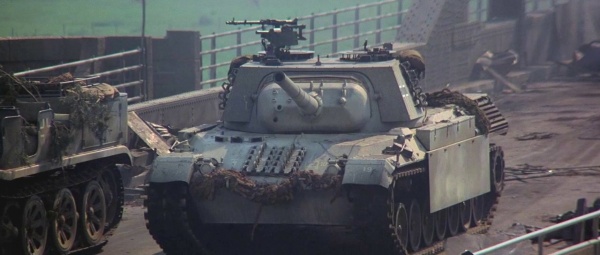
An MG 34 is seen atop a modified Leopard 1 tank.

A German soldier opens fire at the Polish paratroopers landing in Holland.
MG 39/41
The MG 39/41 is used by German troops.

MG 39/41 - 7.92x57mm Mauser. The characteristic feature of the early model is a white grip cladding made of metal and a horizontal charging handle.

An MG 39/41 is carried by a retreating German soldier. Note the early slab-sided horizontal charging handle, this is possibly the only appearance of this extremely rare handle in media.

During the XXX Corps' advance, German defenders (second and third soldier on the right) are seen with an MG 39/41. This one is mounted on a tripod with a MG.Z.40 scope attached.
Others
7.5 cm Pak 40
German soldiers use several 7.5 cm Pak 40 anti-tank guns in an attempt to repel the XXX Corps' advance.
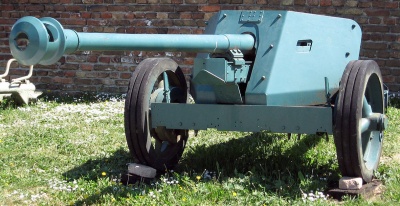
Panzerabwehrkanone (PaK) 40 - 75x714mmR

German soldiers waiting to open fire with their Pak 40s. An interesting note is that by 1944, the German AT-guns were actually painted in either
Olivgrün,
Rotbraun (2) or
Gelbraun camouflage. The gray camouflage seen here, however, is a cinematic means often used to distinguish the different armies. Only at the beginning of WWII, the factory gray was common for heavy weapons. Also worth mention is the insufficient distance between the guns.
5 cm leichter Granatwerfer 36
German soldiers are briefly seen with a 5 cm leichter Granatwerfer 36 during the XXX Corps' advance.
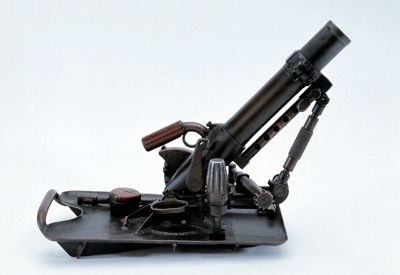
5 cm leichter Granatwerfer 36 (5 cm le GrW 36) - 50mm

German soldiers fire the Mortar.
15 cm Nebelwerfer 41
A 15 cm Nebelwerfer 41 is briefly seen manned by German soldiers.

Nebelwerfer 41 - 158 mm (6.22 inch)
Allied and Axis Armor
Leopard 1 Main Battle Tank (mocked up as a German Panther)
1960s vintage Leopard 1 tanks were mocked up to resemble the World War II German Panther tank. The Leopard 1 tanks had 105mm main guns and two 7.62x51mm machine guns (FN MAGs or MG3s). What is interesting is that supposedly all of the original cast hull Leopard 1 tanks were converted into the newer Leopard 1A1 during the 1970s (with upgraded armor, track skirts and thermal jacket on the gun barrel), however, despite the 'film' modifications to make it look like a Panther, this is an original and unconverted Leopard 1. Since the film was mostly shot on location in the Netherlands (where many of the original battles took place), this is most likely a Dutch Army Leopard, one of the batch purchased from West Germany in 1969 (when the Netherlands officially adopted the Leopard as its main battle tank).
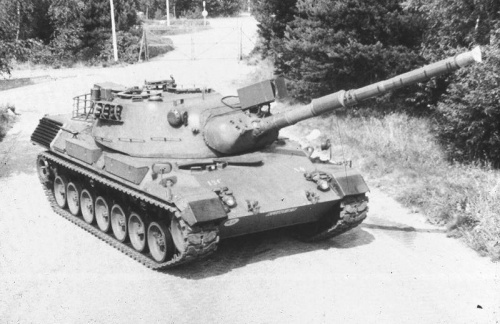
Leopard 1 tank. Notice the marks on the gun mantlet. Also notice how the modern sights and smoke grenade launchers are covered up in the film. Also note the shape of the driver's hatch.
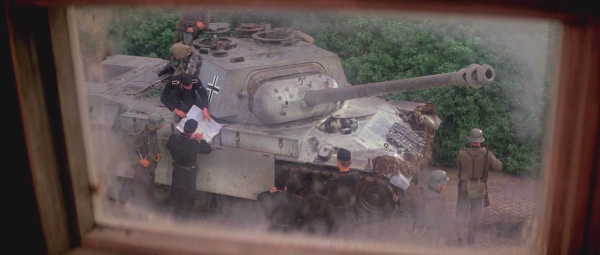
The German "Panther" tank is seen from an attic window. Note that in this shot a fake muzzle brake has been added to simulate the one on the real Panther's 7.5 cm KwK 42 L/70 main gun.

The "Panther" tank front view. The muzzle brake is missing here as the gun is actually seen firing.

Rear view of "Panther" tank.
Sherman Tanks
In order to supplement the actual tanks used in the depiction of the XXX Corps' column, several of the Shermans were actually fibreglass replicas (cast from real tanks) that were placed over LWB Land Rovers.

The tanks seen in this column are of several versions; note the (hard to distinguish) third and the fourth tanks have the less angular cast hull of an early-production Sherman while the others have the later welded hull, and the mixture of early-war vertical and late-war horizontal volute spring suspensions.

This is a late M4A1(76) with the newer E8 HVSS track suspension.

































